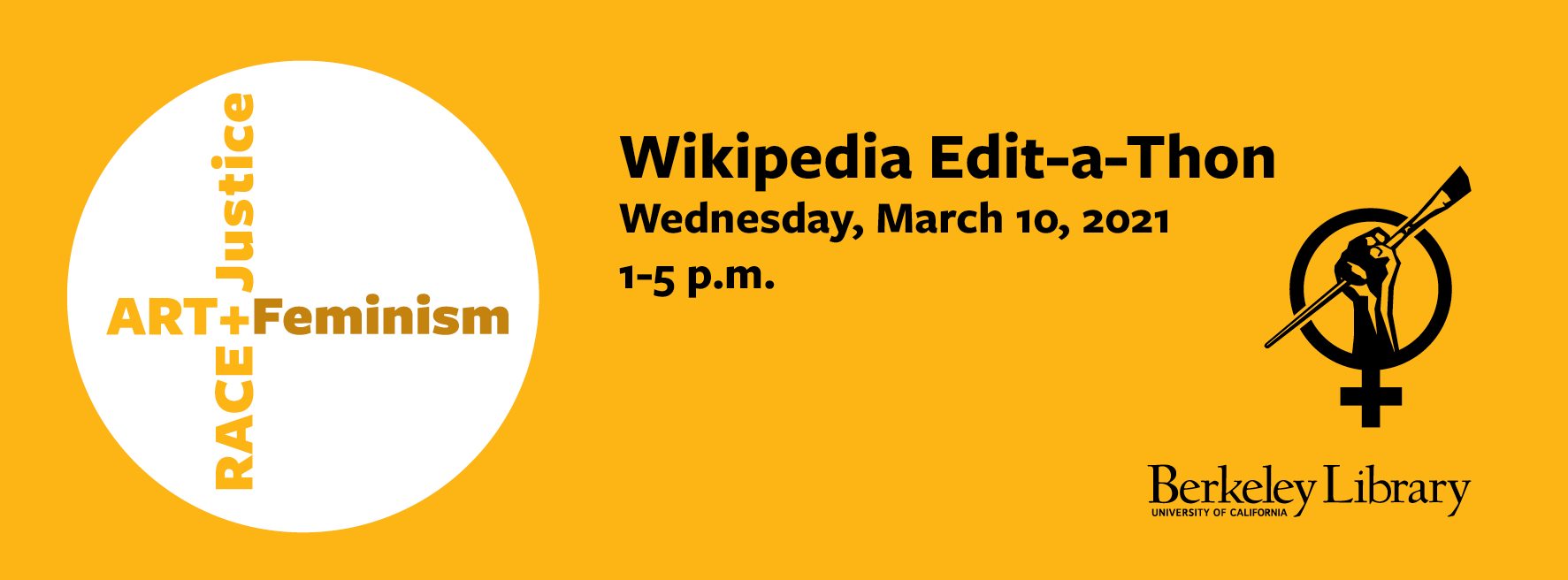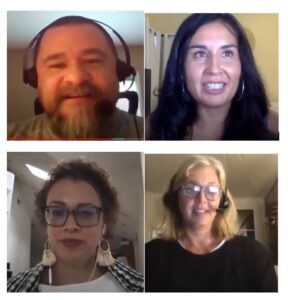Tag: race
Library’s Wikipedia Edit-a-Thon: Coming Soon (3/10) to a Screen Near You!

For many of us in the library, last year’s Wikipedia Edit-a-Thon on March 4 was the final program we held in person before the pandemic lockdowns (we actually wondered at the time whether attendance would be down due to the spread of the virus, but we had a great crowd).
Happily for us, the edit-a-thon, which is an event that gathers people together to expand and improve on the amazing information resource Wikipedia, can easily transition to an online format! The National Network of Libraries of Medicine has been holding national online edit-a-thons for years, and there are many other wonderful offerings, themed and general, to take advantage of online (check out this set of events “Honoring Indigenous Writers” from the University of British Columbia).
So, this year, our edit-a-thon will be virtual. Please come edit with us on Wednesday, March 10, from 1:00-5:00 PM! (or any portion of that time that works for you) We’ll use Zoom as a way to hold our guest speaker session and workshops on how to edit, and we will even have breakout rooms for the various editing preferences and needs of attendees. More information and the schedule can be found here; the only thing you need to do is register using this form (in order to get the Zoom link), and show up online on the day! (It would also be great, if you want to actually edit, to set up your Wikipedia account in advance)
And, about the guest speaker aspect of the event—this year, we are thrilled to offer a two-hour Wikipedia workshop (from 1:00-3:00 PM) created and led by Dr. Alexandria Lockett, from Spelman University in Atlanta, GA. Dr. Lockett will discuss how both new and experienced editors can meaningfully contribute to underrepresented knowledge of Wikipedia through alternative research practices.
Questions? Feel free to email us at editathon@lists.berkeley.edu, and we hope to “see” you on March 10!
“Checking the Boxes” – A panel on race, ethnicity, and the Census
Although we don’t always think of it that way, one federal government program that affects each of us in the United State is the decennial census. And among the challenges of many kinds that a pandemic has brought us, its effects on gathering good quality census data is high on the list.
Earlier this year, the Library hosted a well-attended (physical) exhibit related to the census, Power and the People: The US Census and Who Counts (which can still be experienced online). Related to the exhibit, we were on board with our plan to host a panel of campus experts on the contested race and ethnicity questions in the census, and how they’ve shifted over time…. Until March 17, when the Bay Area went into a shelter-in-place order and the program had to be postponed. But last month, thanks to a persistent team, generous panelists, and the wonders of Zoom, we were thrilled to able to present the panel at last, online!
The program, titled Checking the Boxes: Race(ism), Latinx and the Census, featured three UC Berkeley experts on racial and ethnic categorizations in the census. Cristina Mora (Associate Professor of Sociology and Chicano/Latino studies), Tina Sacks (Assistant Professor, School of Social Welfare), and Victoria Robinson (Lecturer and American Cultures Program Director, Department of Ethnic Studies) were joined by our moderator, librarian Jesse Silva, for presentations and a lively Q&A.
Professor Mora started the program off with the information that “ethnic and race categories are political constructs… They are not set-in-stone scientific markers of identity or genetic composition.” She noted that since the census counts are directly related to funding, communities have a vested interest in getting accurate and complete counts, but this can be very difficult for groups and areas that are designated Hard to Count. Professor Sacks continued by emphasizing the ways in which census-driven funding allocations can affect people in poverty and those in social safety net programs. She also noted the intersections shown by census data between race and place, such as areas with a substantial number of incarcerated people. Finally Professor Robinson added background and context by discussing the site racebox.org, which shows the history of the race questions on the census from 1790 onwards, and which illuminates the changes in the cultural and social conceptions of what race is and how it can be measured.
The program concluded with an animated question and answer period, which included Professor Mora’s elaborating on the differences between racial and ethnic categories, Professor Sacks (who has actually been a census enumerator) discussing the challenges of counting the homeless population, and Professor Robinson revisiting the question of incarceration and the Attica problem: “[Incarcerated people’s] residence is considered to be a prison. That’s not their home, and the relationship then to the power…in the communities that they [aren’t from], that’s the Attica problem.”
Of course, this summary doesn’t do justice to the range and depth of the issues discussed. If you missed this program, or would like to see it again, check it out on the UC Berkeley Library’s YouTube channel!

Come Edit with Us! (at the Wikipedia Edit-a-Thon, 3/4/20)

Umberto Eco, author of The Name of the Rose, said, “The cultivated person’s first duty is to be always prepared to rewrite the encyclopedia.” But, in the case of Wikipedia, we actually get to write the encyclopedia! If you are interested in Wikipedia as a phenomenon and what happens behind the scenes, in learning to edit, and/or in improving the quality and diversity of content in this important resource, join us at the upcoming Art + Feminism + Race + Justice Wikipedia Edit-a-Thon.
Why is this so important, anyway? It’s because Wikimedia’s race and gender trouble is well-documented. While the reasons for the gap are up for debate, the practical effect of this disparity is not: content is skewed by the lack of participation by women and underrepresented groups. This adds up to an alarming absence in an important repository of shared knowledge, which many groups are starting to address.
Art+Feminism is a national campaign improving coverage of cis and transgender women, non-binary folks, feminism and the arts on Wikipedia, and at UC Berkeley we have teamed up with the American Cultures program’s Race+Justice edit-a-thon. Edit-a-thons are a powerful way to address Wikipedia’s gaps in content. The Library is also joined in sponsorship of the event by 150 Years of Women at Berkeley, and suggested editing needs will include topics related to Berkeley alumnae of note.
So, join us in 405 Moffitt Library on Wednesday, March 4 between 11:00am and 5:00pm for an all-day communal updating of Wikipedia entries. Drop in any time! We will provide tutorials for the beginner Wikipedian, reference materials, and refreshments. Check out the schedule at bit.ly/wiki-berkeley for timing of informative talks, instruction sessions, and more. Set up your Wikipedia editing account in advance, or we can help you on the day. Bring your laptop, power cord and ideas for entries that need updating or creation! For the editing-averse, we urge you to stop by to show your support. People of all races and gender identities are invited to participate.
See you there!
NOTE: A Cal ID card is required to enter Moffitt, so those without a Cal ID card need to RSVP to attend the event by March 3.
The Library attempts to offer programs in accessible, barrier-free settings. If you think you may require disability-related accommodations, please contact us.
